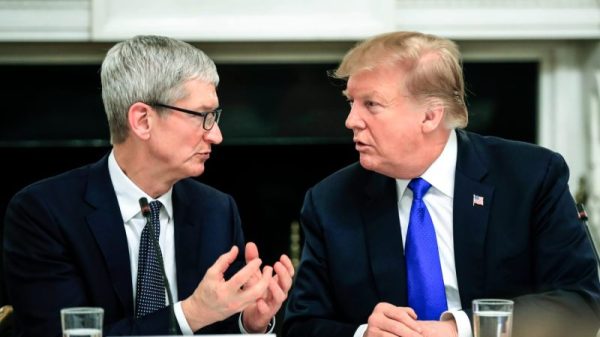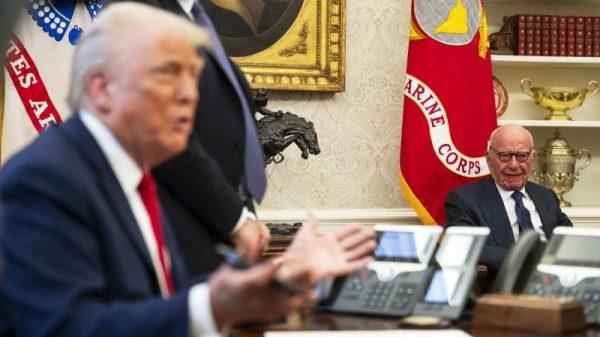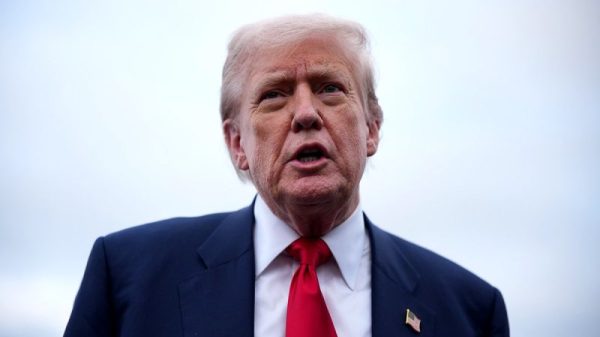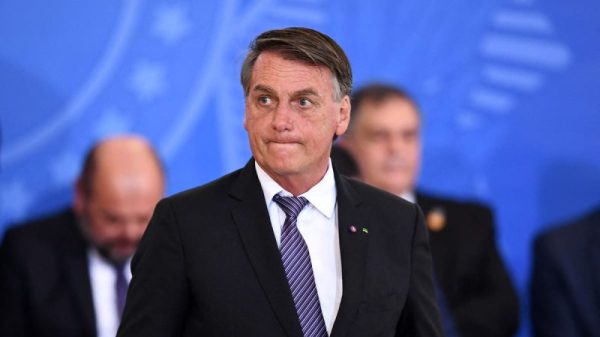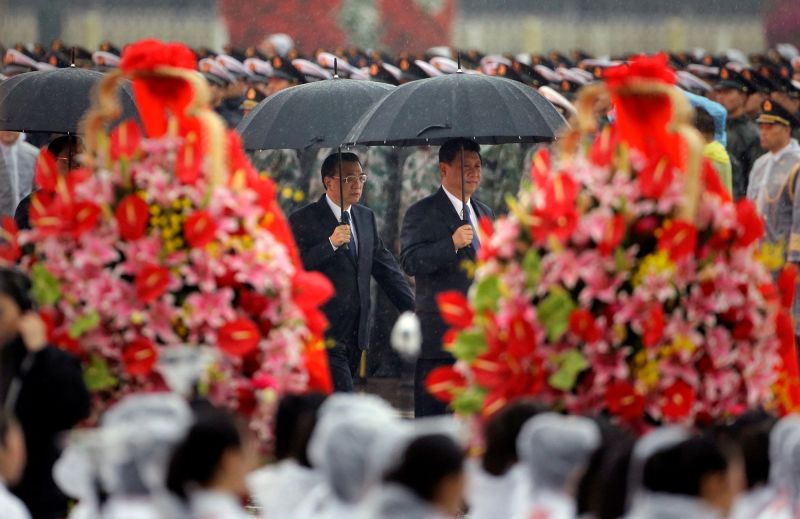The sudden death of China’s former Premier Li Keqiang has spurred an outpouring of grief and mourning across the country. But for many, it also appears to offer a rare opening to air pent-up discontent with top leader Xi Jinping and the direction he has taken the country.
Li, who served as Xi’s nominal second-in-command for a decade until March this year, died of a sudden heart attack Friday in Shanghai, according to state media. He was 68.
His death, just months after his retirement, shocked the Chinese public. Tributes have flooded the country’s tightly controlled internet, while a sea of yellow and white bouquets left in makeshift memorials have sprung up outside his childhood residence and other places connected to his past.
On social media posts and handwritten notes tucked in between the floral tributes, many people commemorated Li for his unrealized aspirations rather than his policy achievements.
Widely seen as being sidelined by Xi – China’s most powerful leader in a generation – Li was considered one of the weakest premiers in Communist China’s history. So instead, many mourners have focused on Li’s unfulfilled visions which, in their view, could have led China on a much different path than the one it has trodden over in the past decade.
“People use this opportunity to express disaffection with Xi Jinping,” said Alfred Wu, associate professor at the Lee Kuan Yew School of Public Policy in Singapore. “It’s a kind of anger – anger toward the current regime.”
A highly educated, reform-minded pragmatist, Li was once seen as a contender for China’s top job. But he ended up as the premier – a role traditionally in charge of the economy.
Normally that position comes with significant influence in the world’s second-largest economy but Li saw his policymaking power gradually eclipsed by Xi, who has centralized control and moved away from the ruling Communist Party’s collective leadership of more recent decades.
To many people, Li represents the potential for an alternative China – less ideologically driven, less authoritarian and more embracing of market reforms, entrepreneurship and connections with the outside world.
Mourners shared Li’s own words as a tribute to him – but also as a not-so-subtle criticism of Xi. Among the most cited was a pledge from Li that China’s reform and opening will never stop, in the same way that “the Yellow River and Yangtze River will not flow backward.” Another of Li’s quotes was mentioned widely as a veiled reminder that a leader’s actions will be judged by history: “The heavens are watching what people are doing.”
Zhang Lun, a professor of Chinese Studies at the University of Cergy-Pontoise in France, said the wave of tributes reflected a “growing discontent toward Xi’s retrogressive policies” over the past decade: the ever-tightening ideological control, the ever-shrinking personal freedoms and the incessant political campaigns that hark back to the era of Mao Zedong, the founder of Communist China.
A large part of the frustration also stemmed from three years of Xi’s strict zero-Covid policies, which battered the economy and subjected millions of Chinese to constant tests, quarantines and citywide lockdowns. Those tough restrictions were lifted abruptly after mass protests broke out across the country.
Adding to the frustration is an ongoing sense of confusion and hopelessness about the future, spurred by China’s economic downturn and inward turn from the world – and all these sentiments were looking for an outlet, Zhang said.
“Although Li was not such a high-achieving historical or political figure, he offered people an opportunity to vent their dissatisfaction,” said Zhang, who studied at the prestigious Peking University with Li in the late 1970s after the end of Mao’s Cultural Revolution.
“In an era where truth is silenced and false, big and empty statements prevail, the basic principles that Li Keqiang adhered to have become very precious things. A show of basic conscience, a few honest words are enough to earn thumbs-up from the public. It reflects people’s anger, despair, and dissatisfaction with reality, which is all projected onto Li,” he said.
Among supporters, Li was remembered as a leader who cared about the less privileged and was willing to speak up for them – even if it jarred with the party’s more triumphant narrative. On social media, many users thanked Li for publicly acknowledging that 600 million Chinese people – or roughly 40% of the population – still had a monthly income of just 1,000 yuan ($137), despite official propaganda hailing Xi’s victory in eliminating poverty.
“Only he understood me,” one highly rated comment read before it later disappeared. “I’ve not had a stable job for four years.”
A friendly face
Over the past decade, Chinese people became used to seeing Li during times of hardship and tragedy. He was often the most senior party official dispatched to share condolences and shake hands with those affected by natural disasters, be it a flood, an earthquake or a pandemic.
When Covid-19 exploded in the central Chinese city of Wuhan in early 2020, it was Li who went there – nearly two months before Xi made the same trip after the virus was largely contained in the city.
Many mourners reminisced about Li’s down-to-earth style and empathy. They shared videos capturing his spontaneous interactions with young people during his many walkabouts, which tended to cut a stark contrast to Xi’s often uptight public demeanor.
In one such video that went viral at the time – and reshared this week – Li memorably appeared without a face mask at a university in Yunnan province in May last year, when many local governments were tightening zero-Covid restrictions to avoid Shanghai’s two-month lockdown.
Bidding farewell to a crowd of students, Li wished them luck in finding their dream job – which was seen by many young people as a comforting, albeit indirect, acknowledgement of their struggle with record youth unemployment.
Xi, in contrast, has admonished youngsters to abandon their “pampered” ways and “eat bitterness” – a Chinese saying for enduring hardship.
In another piece of old footage shared online this week, Li was asked by a university student for a handshake so that he could “brag” to others – using a crass internet slang that would have been frowned upon by party propagandists. But Li extended his hand at the student and asked with a smile: “Have you succeeded in ‘bragging’ now?”
Wu, the expert in Singapore, said Li showed a humane side that is increasingly rarely seen within China’s bureaucracy.
“Everyone looks like a machine, with no personal feeling, no empathy at all. But he looked different – and people remember that,” he said.
Party leader deaths often a sensitive moment
In China, the death of a senior leader is often a complicated and challenging moment for the ruling Communist Party. With open criticism of the regime tightly suppressed and severely punished, public mourning for a popular official can become a rallying point for people to air disaffection with the leadership.
When Zhou Enlai, the beloved premier under Mao, died in 1976, the grieving public took part in massive memorials to channel their discontent with the Cultural Revolution that had unleashed a decade of upheaval, violence and chaos.
More than a decade later, the death of Hu Yaobang, a sidelined reformist leader, triggered mass mourning that snowballed into pro-democracy protests on Beijing’s Tiananmen Square and dozens of other Chinese cities.
That movement, led by university students, ended in a bloody military crackdown that killed hundreds, if not thousands, of demonstrators and ushered in another period of ideological conformity.
The Communist Party, which under Xi has drastically boosted its surveillance power, is once again on the offensive over a recently deceased leader – curtailing and shaping the tributes online and in real life.
On social media, censors have scrubbed videos and posts that showed Li’s reformist leanings or any other qualities that could draw unfavorable comparisons with Xi.
Weibo, a popular microblogging site, blocked searches for “Sadly, It’s Not You,” a love song by Malaysian singer Fish Leong. In recent years, whenever a world leader died, some Chinese users have used the breakup song to express a similar sentiment.
Outside Li’s childhood residence in Hefei, the provincial capital of Anhui in eastern China, rows of government workers stood guard over the mourning crowd, urging people not to linger and examining cards attached to their bouquets, according to eyewitness posts and photos on social media.
Local authorities were also monitoring and keeping a presence at other major sites of mourning, including Li’s ancestral home in a remote village in Anhui, and a downtown square in Zhengzhou, the provincial capital of Henan in central China where Li served as a top official two decades ago.
In other cities, bouquets and notes have appeared sporadically on university campuses, public squares and waterfront parks, but some have been cleared away, according to social media posts.
Li’s remains will be cremated in Beijing on Thursday, with flags to be flown at half mast across the country, the official Xinhua news agency reported Tuesday. Xinhua said Li was “extolled as an excellent CPC member, a time-tested and loyal communist soldier and an outstanding proletarian revolutionist, statesman and leader of the Party and the state.”
Zhang, the expert in France, said Chinese authorities would be cautious in handling public sentiment and avoid actions that might fuel anger. While the mourning for Li is unlikely to trigger a mass protest movement at this point, it could nonetheless become one of the many episodes paving the way for one in the future.
“After this brief venting of discontent, public frustration will continue to build,” Zhang said. “Li’s death has dashed all hope for a potential alternative – and the sense of despair will only accumulate and add to more uncertainty for the future.”






